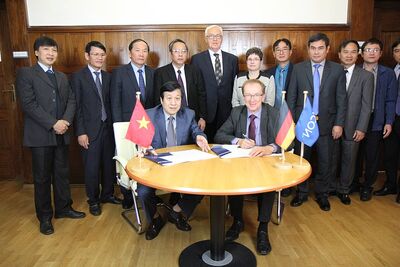GICON and Vietnamese province Quang Binh sign MoU

Both sides want to cooperate more closely in the field of renewable energies
GICON® Managing Director Dr. Hagen Hilse and Nguyễn Xuân Quang, Vice President of Quang Binh Province, have signed a Memorandum of Understanding for further collaboration. The main focus will be on topics related to renewable energies, such as biogas or wind power, as well as wastewater and waste management. Since 2017, GICON® and the Vietnamese province have been linked through project and research work. The province of Quang Binh has extremely attractive geographical and meteorological conditions for the generation of renewable energy from solar and wind energy as well as biomass. The meeting was also accompanied by Mrs. Andrea Voss, project manager of the Wirtschaftsförderung Sachsen GmbH responsible for Vietnam.
Research project was the initial spark
A German-Vietnamese research project commenced in 2017 has already established links with the region. At that time, the focus was on the development of concepts and technologies for areas that do not have access to the central electricity grid. Among other things, smaller wind turbines with an output of up to 200 kW and container-based biogas plants for organic waste were designed. "Our main interest lies in a mutually profitable technology transfer, in which GICON contributes the technological know-how and its engineering capacities, but the main part of the added value lies in plant construction and operation by Vietnamese companies," says Dr. Hagen Hilse, Managing Director of GICON Großmann Ingenieur Consult GmbH.
Conversion and expansion of the Vietnamese energy system
Since the Paris Climate Agreement (2016), Vietnam, like many other countries in the world, has focused on renewable energy production in order to play its part in limiting climate change. The Vietnamese Green Growth Strategy, which is supported by Germany, envisages that in the coming years, even more cooperation can be established in the field of research and development in order to protect Vietnam's precious natural resources and guarantee an efficient and sustainable energy supply.